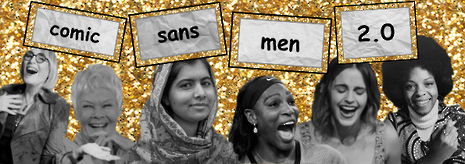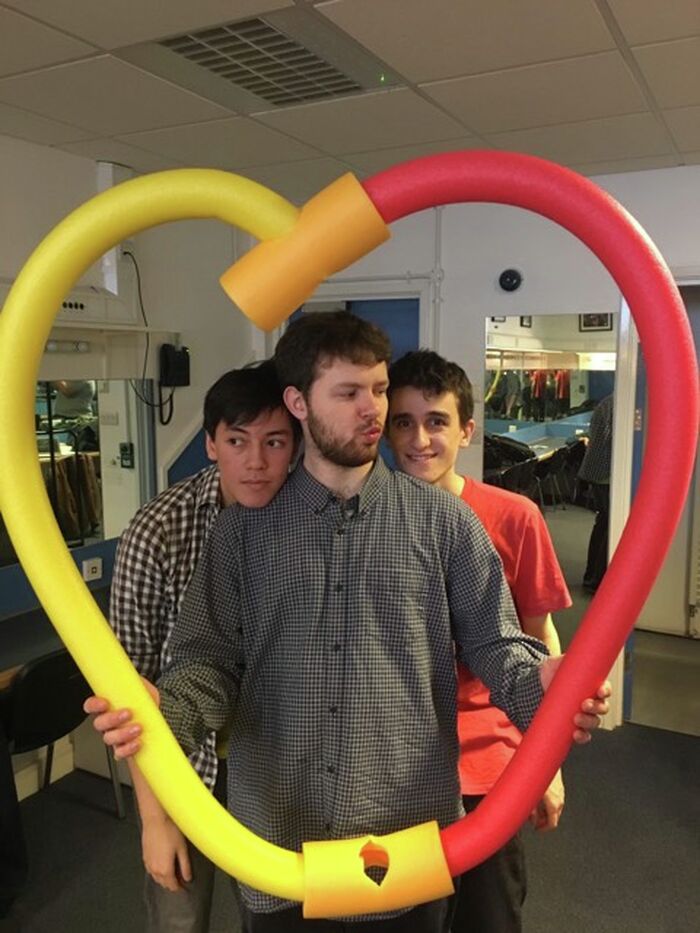Comic Sans Men 2.0 preview
Helen Grant discusses the latest iteration of this women and non-binary sketch show with its directors and members of the cast.

When Sara Hazemi talks improv, she sounds like a High-Intensity Interval Training coach: motivational, but also extremely technical. “You played a lot of games, but play one and go.” “The punchline isn’t everything, but it’s a way to round it off.” “If theatre is life plus ten percent, then improv is life plus a thousand.” It is odd to realise that funniness can have a kind of theory behind it, and even more odd to realise that having the theory explained to you doesn’t make the comedy itself even slightly less funny.
Comic Sans Men burst onto the Cambridge comedy scene almost exactly a year ago, a new improvised sketch show comprising of an entirely female and non-binary cast and a whole lot of belly laughs. Hazemi directs the 2.0 version, having performed in the original run alongside her assistant director - “slash co-director, we’re basically co-directors” - Eliz Avni. The format of the show has been largely left the same. The key difference comes from the performers themselves: “We took a bit of a risk this year,” Hazemi tells me. “We didn’t cast any Impronauts, and we only cast newbies and people with no improv experience, because it’s a platform show and that’s the point. Why take up space with someone who’s done three years of improv already?” The exceptions to this are the two compères, Ania Magliano-Wright and Bella Hull, who will be improvising monologues between sketches.
“The troop’s delight in all things silly is infectious"
Hilarious for the people watching, but terrifying for the performers? “Bit nervous, not gonna lie,” Elton says, “but at least you’re never going to be alone on stage.” The friendship between the cast members is clearly hugely important in bringing both humour and morale. “You just have this blind faith,” Hazemi agrees, “this trust in these people that you may have only known for like a month.”
I join Hazemi and performers Ella Burns, Alice Tyrrell and Lottie Elton for a small workshop just before their penultimate whole-cast rehearsal.
“I genuinely see it as a platform space,” Hazemi says. “I don’t see this as a solution, I don’t think that female and non-binary spaces are the end of the process; I think it’s a platform to then transition performers into the wider world.” A training platform as well as a podium, then, with a fairly pressing incentive to develop new improv stars: “A lot of the Impronauts who were female/non-binary members have graduated.”
“I know for me I don’t think I would have auditioned for the show if it wasn’t all female and non-binary,” Burns says. “Seeing people doing it makes you want to do it as well.” I ask whether the group think female and non-binary comedy is noticeably different from male comedy; “The thing about comedy is that it works when you can relate to aspects of it,” Tyrrell replies. “If you’re a woman in the audience you’re going to be able to find connections with more things if there are women on stage, same if you’re non-binary, same if you’re a man.”
If improv can come across as a little anarchic, Comic Sans Men 2.0 both reinforces and challenges this. “It’s a skill”, Hazemi stresses, multiple times. Her appraisals of sketches are meticulous, comedy is broken up into “escalations”, “subversions”, “status-shifts” and, most entertainingly, “pimping”. “Some people see improv as like, 'Say the wackiest thing!' and sometimes it is, and sometimes that’s funny, but it also isn’t just that.”
I ask if they’ve spotted any recurring themes. “Eliz likes talking about her nostrils”, Burns tells me. Aside from this, everything is always new. “I would say the thing with improv is that it depends what they tell you to say,” Hazemi intervenes. “If your prompt from the audience is like ‘potato farm’, the scene’s going to be about a potato farm. If the prompt is ‘dildo’, which it almost always is, then it’s gonna be a scene about a dildo.” Among the more outré premises: “The other day I was a wax strip, like literally you can do whatever you want. I was a wax strip and Eliz was an epilator, like what?! There’s no space for stereotypes, there couldn’t be even if we wanted it to be, and frankly, we don’t.”
"The word that keeps coming up throughout the rehearsal is ‘playful’, and the troop’s delight in all things silly is infectious. “I’ve been doing this for a year, and you’ve been doing this for four weeks,” Hazemi reminds her protégées, all of whom are already wonderfully funny. Cambridge comedy is going through a renaissance; those taking time out to see Comic Sans Men 2.0 will be right at the heart of it.
 News / CUP announces funding scheme for under-represented academics19 December 2025
News / CUP announces funding scheme for under-represented academics19 December 2025 News / Cambridge welcomes UK rejoining the Erasmus scheme20 December 2025
News / Cambridge welcomes UK rejoining the Erasmus scheme20 December 2025 Comment / Yes, I’m brown – but I have more important things to say22 December 2025
Comment / Yes, I’m brown – but I have more important things to say22 December 2025 News / SU reluctantly registers controversial women’s soc18 December 2025
News / SU reluctantly registers controversial women’s soc18 December 2025 Film & TV / Timothée Chalamet and the era-fication of film marketing21 December 2025
Film & TV / Timothée Chalamet and the era-fication of film marketing21 December 2025









